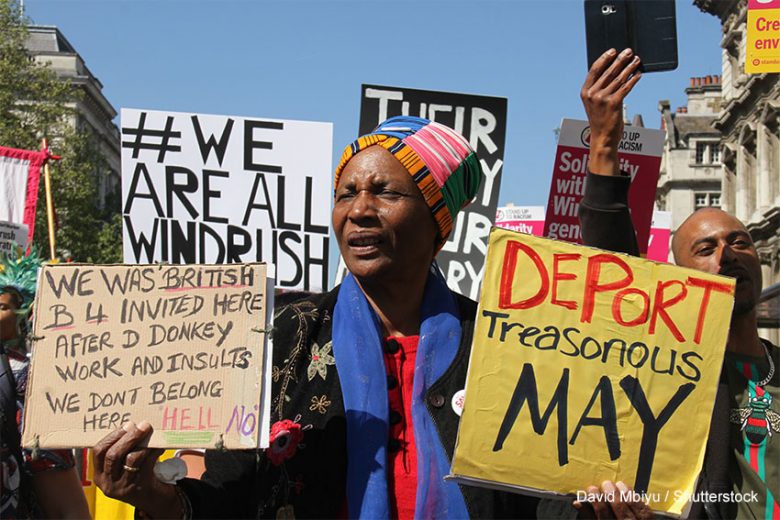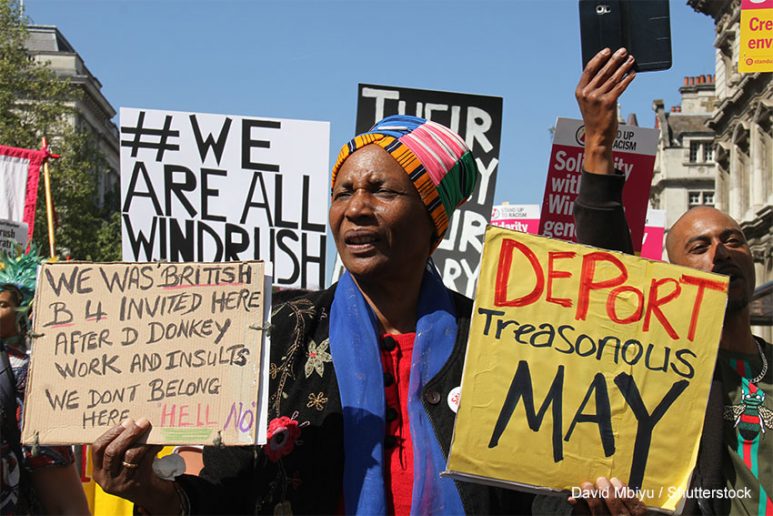By Hannah Ajala
Stories affecting Black people over history within our communities are often shared throughout the year, not just when it is a particular anniversary. Things can often trend and then go viral, sparking wider conversations, and most importantly, shedding light on stories that all of society should know about. The news and attention of the Windrush generation truly came to light during a scandal that broke out in 2017, where hundreds of Commonwealth citizens, many of whom were from the ‘Windrush’ generation, had been wrongly detained, deported and denied legal rights.
The Windrush Scandal shocked a large number of the British population, however, before it happened many were unaware of the Windrush generation and its impact on the British society. On a personal level, I was lucky to know people from the Windrush generation personally. However, this part of the country’s history is not taught at schools. Hundreds of personal accounts and stories from those who know someone affected were shared across several news outlets, petitions, and social posts. The British government came under fire for mistreatment of those from the Windrush, and many individuals from the Black British community stood in solidarity with them.

Windrush Day takes place on 22 June – a special day to remember when around 500 migrants from the Caribbean arrived at Tilbury Docks in Essex in 1948. This year the government has announced that it will be giving £500,000 to charities, community groups and councils across England to mark the event.
Personal experiences could shape a journalist’s perspective and approach of storytelling. The Windrush Day brought to my attention the Black journalists – who were in fact a descendant of the Windrush generation. Sharing these experiences is important as it is a reminder to all audiences, whether they are listening, reading or watching; that it is crucial for diversity and inclusion to be present within the industry of journalism, as it is an example of being reflective to the audiences we are speaking to. Journalists like Nadine White, and Azana Francis who we are about to learn more about, are reflective of audiences with a close connection to such a deep rooted history like the one this period commemorates.
Grandad was very frank with us about his experiences of navigating Britain as a Black migrant in the Windrush era. We listened and will continue to tell those stories…in keeping with the traditions of our ancestors before us. Selah. #WindrushDay2021 pic.twitter.com/7X5qXzoFrT
— Nadine White (@Nadine_Writes) June 22, 2021
Daniel Henry is a British journalist and reporter, born to parents originally from the Caribbean. He says that the Windrush day should be celebrated as a Bank Holiday in the UK and it should be taught in the school curriculum.
“We should know everything about the Windrush generation; who came, why they came, how many of them, etc.Not many people know, but on the same boat as the Jamaicans, were also dozens of Polish people. It would be very great to know that detail. There needs to be a lot more investment in the day as well as media coverage,” he tells Media Diversity Institute.
Knowledge truly is power. This would not be the first time one mentions the constant need and push for schools in the UK to be educated about history based on the lives of Black and minority ethnic people, and their contributions to what truly made Britain. Being Black British in schools all over the UK, always meant that the likelihood of Black history being a part of the curriculum, would always be a slim chance.
That is what several of the Windrush generation did. They worked tirelessly, helped to make the economy more stable, and contributed widely to the entire nation. Azana Francis is a journalist and producer, and also a descendant of the Windrush.
When I see old family pictures I am reminded that there is so much more to our stories than injustice and sadness! There is so much inspiration and beauty… Our communities have contributed so much to Britain and is a huge part of what makes this country great #WindrushDay pic.twitter.com/g7hY2M5AMT
— Azana Francis (@AzanaFrancis18) June 22, 2021
“Windrush day is often a personal day of reflection for me, I think about my grandparents who are the foundations of who I am- I think about my tiny island of Grenada and how such a small place can create a people filled with so much pride, determination, and ambition. Their sacrifice and dream to leave everything they ever knew in pursuit of a better life is not just aspirational but damn right brave,” Francis tells Media Diversity Institute.
However, she also mentions the impact of her family’s experiences to her personally and what it means to be Black in Britain.
“But I personally have decided to not allow the day to be co-opted by the darkness that met them at the shores, the signs that called them the N word – or told them to ‘go home’. I personally decided not to think about how my grandmother missed her babies, or how my grandfather had to swallow his pride in the face of racism despite being awarded a British Empire Medal award, granting him the official title SIR,” she says.
Azana’s family history and her grandparents’ experiences was what inspired her to pursue her dreams and become a journalist.
“What I choose to think about is how far we as people have come, how the greatest gamble of their lives paid off – I think about how I am the manifestation of all their dreams- I am what they sacrificed for – my freedoms, and my opportunities. My grandparents never lived to see me go to university, have a baby or become a journalist at the BBC. The BBC was the only network that was broadcast across the islands- I am a journalist because of them, I dream big because of them, I have no fear because I know I will never face what they had to,” she explains.
“On Windrush Day, I choose to focus on what and who we are. On Windrush Day I think about the light, beauty, the culture, the flavour, the music, the warmth and vibrancy that we imported here. I think about the black and white church photos that show my grandparents and my dad dressed up to the nines, with their heads and chests held high. I wish we could focus on how they built this country- the U.K. They are essentially what made this country. We are Britain – and it’s them who brought this country back from the darkness of war – and it is their light, joy and perseverance which adds to the reason we should always celebrate on Windrush Day and beyond,” she continues.
It is very humbling to learn from Black journalists who have such a close relationship with a generation who have made such a huge impact on British culture.
It has been a strong learning curve for myself, and I hope the same for many others who learned about the significance of this day, and the legacy left behind.

